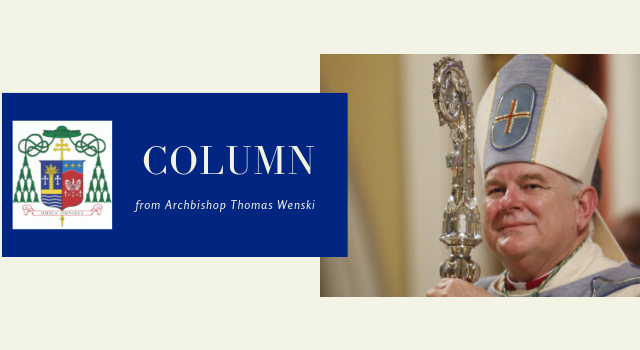By Archbishop Thomas Wenski - The Archdiocese of Miami
“Where do we go from here: Chaos or Community”: This was the title of Dr. Martin Luther King, Jr.’s last book, written one year before his assassination in 1968. More than 50 years later, the question posed by the title of Dr. King’s book has lost none of its timeliness. America continues to deal with the sad legacy of racism as well as with growing social and economic inequality that has been exasperated by our throwaway culture and the globalization of indifference and, in recent months, by a global pandemic. As we face a triple crisis — a health crisis, an economic crisis and a societal crisis — chaos cannot be an option.
As Pope Francis said in his Wednesday audience of June 3, 2020:
“...we cannot tolerate or turn a blind eye to racism and exclusion in any form and yet claim to defend the sacredness of every human life. At the same time, we have to recognize that the violence of recent nights is self-destructive and self-defeating. Nothing is gained by violence and so much is lost.”
All Americans of good will are united in denouncing the unjustified killing of George Floyd. We also should be united in denouncing the deaths of those who lost their lives in the ensuing violence that has plagued our cities, including those police officers who were killed or injured in the line of duty, protecting the life and property of our people.
George Floyd was an African American and he was killed by a white policeman. Racism has been described as America’s original sin. And legitimate grievances about racism have sparked the outrage that has sustained growing protests throughout the nation. But outrage about racism does not fully explain why thousands of mostly millennials have taken to the streets in recent days.
America is at its best when the rights of the weak and vulnerable are protected and not viewed as expendable. Yet, we are far from our best when, in some cities, more than half of pregnancies end in abortion; and when economic and social forces discourage young people from committing themselves to marriage, so necessary for the flourishing of children (consider for example the ongoing housing crisis). We are far from our best when public schools in many parts of our country fail to educate children to grade level. We are far from our best when the middle class is disappearing, especially in “fly over” states where suicide and drug addiction constitute a health crisis that predates the current coronavirus pandemic.
We are living through difficult times. Some have described our times as being not so much an era of change but the change of an era. One of the signs of the times is that all of society’s institutions are being called into question. Certainly, in recent years, these institutions have been undermined to one extent or another because of corruption and greed and because of the abuse of authority and power. Positions of service are turned into instruments of personal gain. We see this in politics, we see this in academia, in the media, in the entertainment world, and in business. Tragically, we have also seen this in the Church.
When society’s institutions are discredited, and our elites are perceived to be corrupt, we are left rudderless. In a sea of moral relativism, people feel set adrift — and this is perhaps the reason for their outrage, which is often a projection of their fears. When a democracy bases itself on moral relativism, and when it considers every ethical principle or value to be negotiable (including every human being's fundamental right to life), it is already, and despite its formal rules, on its way to totalitarianism. The “might of right” quickly becomes “might makes right.”
The shrill polemics that pass for debate and argument today only feed popular outrage, generating much heat but little light. We need to move beyond the polarization that only further divides us as a nation. If we allow ourselves to be blinded by outrage, justice will no longer prevail and then a benighted tribalism will inevitably overtake us.
America is at its strongest when all our institutions promote the common good and work for the advantage of everyone. Where do we go from here? If community is the only viable option, then as a nation we need to recommit ourselves to common truths “derived from the Laws of Nature and Nature's God,” as eloquently expressed in the Declaration of Independence.
But today, America weeps. May her tears water a new flowering of liberty and justice for all.

